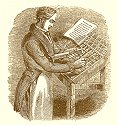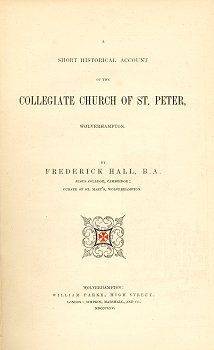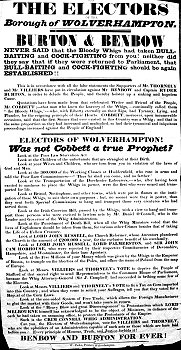The next printer on the scene was Joseph Smart, who Lawley seems to consider an altogether better printer than his predecessors. Certainly more of his works survive. Lawley gives the following account of Joseph Smart: "Born in Wolverhampton in 1728 and educated at the Wolverhampton Free Grammar School, he there acquired a knowledge of classical literature, and a love of books, which influenced him to adopt printing as a vocation, and become to a certain extent a patron and encourager of local literature. He commenced business in the house on High Street, occupied by the late Mr. William Parke, having mastered the art partly under Baskerville, of Birmingham, and partly under a London printer. His taste and judgement were speedily acknowledged by the local literati …. His house became the centre of intellectual activity, his friends were numerous, and at his symposia were discussed all the learned topics that were then agitating the country". In May 1778 he married Mary Morris (note that by now he would have been 50) and they had at least one child, Joseph Smart (junior) who was baptised in June 1780. Mander says that Joseph Smart "was without a rival for many years and much business came his way". His success and status are reflected in the fact that in April 1787 he was elected one of the Town Commissioners. His business and dwelling house were, according to Mander, "at the corner of the High Street next door to John Hanbury, mercer and draper". By 1790 he had taken over Hanbury’s premises and in 1790 he advertised that "he is removed from No.37 to No.48 (formerly the Angel Inn) in the High Street". Smart’s recorded works, which date from about 1760, include books of sermons and books of poems, and for these Smart would have been publisher, printer and bookseller. His premises would have been a literary centre and he would have been the sort of man who induced Dr. Johnson to remark (in 1756) "The booksellers are generous, liberal-minded men". The remarkable Wolverhampton poet William Vernon was encouraged by, and first published by, Smart and of him Vernon wrote:
But Smart had to make a living as well and his print shop is known to have produced a printed version of their charter for Walsall Corporation and work for the Benevolent Society of Stafford. Doubtless he did much commercial work as well and there may well, by now, have been other printers in town picking up purely commercial work. Smart was both printer and bookseller and his advertisements, in which he lists some of the items for sale at his premises, almost certainly list things printed by himself and things printed by others. But they include "new and old ballads, Godly and other patters, carols, Cock Robin, Tom Thumb and various other playbooks for children" as well as many chap books and "two sheet maps, copper royals, coloured woodcuts, children’s lotteries, etc.". The expansion into the Angel Inn seems not to have been a success. In 1792 Smart printed a catalogue for the sale of his entire stock: he was bankrupt. His creditors were paid 10s in the pound and Smart himself retreated to "The Chronicle Office, No. 9 St John Street". This "Chronicle" was the Birmingham and Wolverhampton Chronicle which it seems Smart carried on, probably with others, but which only lasted a year, closing in 1793. Smart continued printing from his new address but with noticeably poorer type and production standards. His business seems to have failed again in 1802 and he is heard of no more until he briefly and finally reappears as a compositor in London in 1809. At this point it might be as well to admit that most of the above is probably correct enough, with some doubts about the later part from his apparent bankruptcy onwards; but that there is much room for confusion, which Lawley and Mander in their efforts seem only to compound. The question of who did what and when – and even who exactly was who – needs further consideration than it has received here. So the rest of this account is offered somewhat tentatively. At some point, not dated by Lawley, Joseph Smart’s business came into the hands of his son, another Joseph Smart. The first book Lawley attributes to him in an anti-slavery tract, dated 1788. Lawley says: "The younger Smart, who seems to have followed in the footsteps of his father, was the founder of the Wolverhampton Chronicle, the earliest newspaper published in the south of the county. He was the printer of many volumes of all kinds and his trading career extended over a period of nearly fifty years. He was unfortunate in business in the year 1792 and had several partners at different periods, his last being the late Mr. Parke". This does not square with the earlier account. It suggests that the person who founded the Chronicle and went bankrupt was Joseph Smart junior not Joseph Smart senior. It also does not explain how this bankrupt business came to be in existence for many years afterwards. There are worse complications. It seems that at some point there was a Thomas Smart and it may be that he was the son of Joseph Smart senior and the father of Joseph Smart junior. This seems at least a good possibility, otherwise we have only two men to cover a period of 103 years - which is not impossible but is less likely than there having been three generations. Also it seems that, for a long time if not always, Joseph Smart junior used the old imprint "J. Smart" to which, by 1814 at the latest, he had added the words "at the Chronicle Office". Thus in 1812 we note a book printed by Gower and Smart, Chronicle Office; but later works revert to being simply J. Smart, Chronicle Office. By 1825 Smart is adding an address: 18 High Street. Lawley then gives us another account of Joseph, failing to explain that this is the junior, not the senior, Joseph Smart. Lawley says of this Joseph Smart: "It would be unpardonable not to allude to the close of the career of the best known of our early local typographers, [Lawley always uses the word "typographer" as if it were synonymous with "printer"] Mr. Joseph Smart. …. In the year 1812 Mr. Smart took as an apprentice William Parke, a Brewood youth, who was destined to become his successor. In 1828 the two became partners, a connection which existed until 1831, when Mr. Smart died, full of years and highly respected. His career had not been one of unvarying success; but he never lost his integrity of character, nor his love for books and authors".
Of William Parke, Lawley says: "William Parke was born at Brewood on 23rd March 1797. He was educated at Brewood Grammar School, then under the mastership of the Rev. Henry Kempson M.A.. When 15 years old Mr. Parke was apprenticed to Mr. Joseph Smart, the printer and proprietor of the Wolverhampton Chronicle, with whom he remained when out of his time. He had shown such business abilities that in 1828 Mr. Smart took him into partnership. On the death of Mr. Smart in 1831, Mr. Parke with Mr George Robinson purchased the copyright of the Chronicle but, finding the responsibilities of ownership too exacting, he sold his share in 1833. … He died on the 10th June 1876". From this it appears that someone called Smart was the proprietor of the Chroncile and a printer, and was in partnership with Parke who, on Smart’s death in 1831, took over the Chronicle. Parke then sold his interest in the Chronicle 1833 to concentrate on his printing firm.
|



